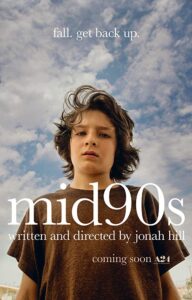Disturbing, but often insightful, Jonah Hill explores the experiences of a teen in the mid 1990s.

 The punching bag for his older brother Ian (Lucas Hedges), 13-year-old Stevie (Sunny Suljic) is searching for his place. Ian is angry and confused, abusively venting his frustration on his little brother. Almost like some kind of a serial killer, Ian keeps his room in perfect order. Stevie idolizes him. Their single mother, Dabney (Katherine Waterston), is still very young. Although she’s on the prowl, looking for a partner, her hard partying is behind her. Still, Stevie is given a great amount of freedom, as Dabney seems very much out of the regular parental picture.
The punching bag for his older brother Ian (Lucas Hedges), 13-year-old Stevie (Sunny Suljic) is searching for his place. Ian is angry and confused, abusively venting his frustration on his little brother. Almost like some kind of a serial killer, Ian keeps his room in perfect order. Stevie idolizes him. Their single mother, Dabney (Katherine Waterston), is still very young. Although she’s on the prowl, looking for a partner, her hard partying is behind her. Still, Stevie is given a great amount of freedom, as Dabney seems very much out of the regular parental picture.

One day, Stevie wanders into a local skate shop. After being rejected by Ian, Stevie seeks friendship, and he notices an interesting group of teens on the street. The skate shop is that group’s hangout. In time, Stevie joins the teens, learning to skate, but picking up their bad habits in the process. Led by two older boys, Ray (Na-kel Smith) and Fuckshit (Olan Prenatt), Stevie’s maturation takes a wrong turn amid constant drinking, occasional drug use, and sexual experimentation.

Written and directed by actor Jonah Hill, “Mid90s” adopts a cinéma vérité approach that reinforces the authenticity of the events. Shot in the 4:3 aspect ratio, we see the kids being kids, as if we are a fly on the wall. The dialogue is harsh and will offend some viewers, especially in light of the current political and social atmosphere. Criticism of the language is unfair, I think, because this is the way these kids actually spoke. Still, a word of caution is in order. This is not a film for younger viewers, like tweens.

What’s disturbing is the handling of sexual experimentation involving the younger star Suljic. In one scene, Stevie is preyed upon by an older girl. It’s really hard to watch. And “preyed upon” is perfectly accurate, the older girl takes him to a bedroom and fools around with the little boy. Then Stevie proudly jokes about it with his group of friends. I questioned whether this scene is necessary, particularly with the tone employed. It’s a problem that permeates the film.
To his credit, for better or worse, Hill doesn’t seem to be making any real value judgments. His film is a naked portrayal, although delivered lovingly, with rich flowing score, and excellent performances. The script is Hill’s construct, entirely within his control. And he made the choice to include a sexual experience involving a 13-year-old, played by an actor who is just now 13 in real life. Like Larry Clark’s “Kids,” the 1995 film that featured graphic adult situations involving minors, “Mid90s” is likely to court controversy. The question is that controversy important, does it serve a purpose?

What’s important to point out is that there is a difference between documentary filmmaking and the scripted narrative variety. In pursuit of truth in his story, Hill is intent on showing everything, warts and all. But, in doing so, he places a young actor, at least on screen, in an awkward and uncomfortable (particularly for the viewer) adult situation. The efficacy of this is fair to question.
What surprised me is that even with the brave portrayal of Stevie by the young actor Suljic, I did not emotionally connect with the character and his plight. Instead, the emotion I experienced, as a father of a 14-year-old, was outrage. And if this is Hill’s intent, he succeeds. However, I get the impression that Hill is attempting to celebrate these young people and their carefree lifestyle. The film largely romanticizes the skater group’s experiences.

Compare Richard Linklater’s “Boyhood,” which “Mid90s” is certainly trying to evoke in microcosm (just compare the posters). And contrast Gregg Araki’s incredibly insightful 2004 feature “Mysterious Skin.” Back when “Skin” was on the festival circuit, I made the mistake of passing on an interview with the talented Araki, because the film had similarly outraged me. Later, I learned that green screen was used to create some of the movie’s biggest moments.

But despite my problems with “Skin,” it resonated with me powerfully. Joseph Gordon-Levitt had one of his breakout moments with that film. Suljic, who is excellent as Stevie, similarly has a breakout with “Mid90s,” but the movie might not be strong enough to garner him awards consideration. Araki’s story of a teen hustler helped bring awareness to a wrong, exploring how the central character (played by the young Gordon-Levitt) was being exploited. In “Mid90s,” I didn’t see the public service announcement, rather, the bad-behavior is chalked up as part of the process of coming of age. The tone is what rankled me, even as the film draws to a conclusion with events meant to slow things down and offer something of a reality check.
A slice of life, a bit of uncomfortable truth, actor Jonah Hill builds a convincing world, but doesn’t really know how to make it matter.
